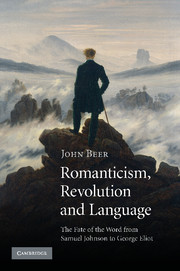Book contents
- Frontmatter
- Contents
- Preface and acknowledgments
- List of abbreviations
- 1 ‘Democracy’ in Somerset and beyond
- 2 Politics, sensibility and the quest for adequacy of language
- 3 The heart of Lyrical Ballads
- 4 The Prelude: a poem in process
- 5 Words or images? Blake's representation of history
- 6 Blake, Coleridge and ‘The Riddle of the World’
- 7 Challenges from the non-verbal and return to the Word
- 8 The Nature of Hazlitt's taste
- 9 Jane Austen's progress
- 10 Languages of memory and passion: Tennyson, Gaskell and the Brontës
- 11 George Eliot and the future of language
- Index
5 - Words or images? Blake's representation of history
Published online by Cambridge University Press: 04 August 2010
- Frontmatter
- Contents
- Preface and acknowledgments
- List of abbreviations
- 1 ‘Democracy’ in Somerset and beyond
- 2 Politics, sensibility and the quest for adequacy of language
- 3 The heart of Lyrical Ballads
- 4 The Prelude: a poem in process
- 5 Words or images? Blake's representation of history
- 6 Blake, Coleridge and ‘The Riddle of the World’
- 7 Challenges from the non-verbal and return to the Word
- 8 The Nature of Hazlitt's taste
- 9 Jane Austen's progress
- 10 Languages of memory and passion: Tennyson, Gaskell and the Brontës
- 11 George Eliot and the future of language
- Index
Summary
The nature of London as it presented itself to an observer in the 1790s was most memorable for a lack of organization that amounted at times to near-anarchy. Wordsworth, arriving as a young man, noticed this confusion above all:
All moveables of wonder, from all parts,
Are here – albinos, painted Indians, dwarfs,
The horse of knowledge, and the learned pig,
The stone-eater, the man that swallows fire,
Giants, ventriloquists, the invisible girl,
The bust that speaks and moves its goggling eyes,
The wax-work, clock-work, all the marvellous craft
Of modern Merlins, wild beasts, puppet-shows,
All out-of-the-way, far-fetched, perverted things
All freaks of Nature, all Promethean thoughts
Of man, his dullness, madness, and their feats
All jumbled up together to compose
This parliament of monsters. Tents and booths
Meanwhile – as if the whole were one vast mill –
Are vomiting, receiving, on all sides,
Men, women, three-years' children, babes in arms …
To someone who had been brought up in the Lake District – even if he had also been educated in Cambridge – the experience of living in a metropolis where one might not know even the identity of one's next-door neighbour gave an overwhelming sense of human fragmentation.
As a feature of city life, the lapse into dissociation and the rise of individualism had been an increasing phenomenon at least since the seventeenth century.
- Type
- Chapter
- Information
- Romanticism, Revolution and LanguageThe Fate of the Word from Samuel Johnson to George Eliot, pp. 80 - 98Publisher: Cambridge University PressPrint publication year: 2009



